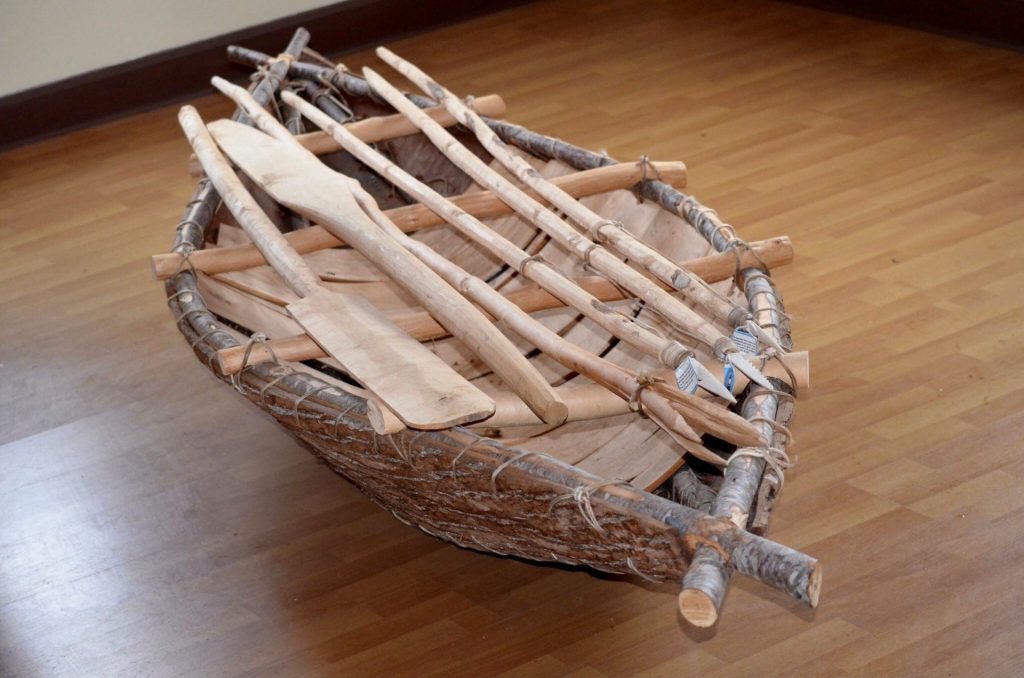By Paul Merchant.
Cast your eyes over a map of Chile, from top to bottom, and you’ll notice a strange development. South of Temuco, the lakes become more frequent and larger, and eventually, after Puerto Montt, the land fragments into hundreds of islands, some quite large, like Chiloé, and many that are very small. You can travel by road as far south as the town of Villa O’Higgins in the Aysén region, but beyond that, unless you cross into Argentina, a boat is the only option. In Chile’s far south, the Andes seem to gradually sink into the Southern Ocean.
This remarkable landscape (though perhaps seascape would be a more appropriate term) is home to communities whose lifestyles and methods of travel offer visions of identity and belonging beyond Chile’s current political order.

My research project ‘Reimagining the Pacific: Images of Ocean in Chile and Peru, c.1960 to the Present’, which is supported by the Arts and Humanities Research Council, explores how cultural responses to the ocean reveal contemporary ecological challenges and neglected local histories. In Chile, the last ten years have seen increased interest on the part of documentary filmmakers in the past and present of indigenous communities in Chile’s watery south. These communities, such as the Kawésqar and the Yaghan, suffered terribly as a result of the arrival of European explorers, missionaries and colonisers in the nineteenth and early twentieth centuries, with many dying from disease and malnutrition, and some groups disappearing entirely.
Yet not all is lost. In Patricio Guzmán’s documentary El botón de nácar (The Pearl Button, 2015), we meet Martín González Calderón, a Yaghan man who explains how the Chilean Navy’s strict control over maritime space has made it almost impossible for him and his family to travel by boat using the skills and techniques passed down over generations.
Guzmán also speaks to Gabriela Paterito, a Kawésqar woman who recounts a long journey by canoe that she made when she was a girl, and the director prompts her to state that she does not feel Chilean at all. In Guzmán’s film, indigenous mobility by water in the Patagonian archipelago is presented as lost to the past, and impossible in the present (I’ve written elsewhere about how Guzmán consistently relegates indigenous experience to a separate timeframe, or even a separate world).
Other filmmakers have taken a different approach to these issues, however. In Tánana, estar listo para zarpar (Tánana, being ready to set sail, 2016), for instance, we meet Martín González Calderón again, but this time at much greater length. The documentary’s directors Alberto Serrano Fillol and Cristóbal Azócar do not provide an explanatory voiceover. Instead, the camera follows González Calderón as he goes about his daily life, and then seeks to build a boat in which he can recreate a childhood trip around the False Cape Horn, near the southern tip of the continent, that he undertook with his father.
Another documentary from 2016, Alas de mar (Sea Wings) exhibits some similar characteristics. Here, the director Hans Mülchi does provide a voiceover, but it is intermittent and reflective. The film follows the journey by boat of two Kawésqar women, Rosa and Celina, back to the region where they grew up. The voices of Rosa and Celina are much more prominent than that of Mülchi, or indeed that of the European anthropologist who is travelling with them.

It is not only the human voice that counts, though. Both Tánana and Alas de mar contain long sequences in which the only sounds audible are the sounds of travel by sea: the flapping of a sail, the rush of the wind, the crash of waves against the hull, or the roar of a motor. This openness to the sounds of the marine environment allow the spectator to share in the embodied experience of the protagonists in a way that escapes any definitions that might be imposed by spoken or written language.
It is precisely because Alas de mar and Tánana do not offer definitive answers to the question of the relation between indigenous identity and Chilean identity that I find them valuable to think with. The people whose stories are told in these films have been displaced from their childhood homes (as is the case for Rosa and Celina), or are held in place by the state’s unwillingness to allow maritime travel outside of specific, limited purposes (in the case of Martín). And yet we see them strive to retrace past journeys and reclaim certain modes of mobility as an essential part of their heritage.
In fact, indigenous identity itself appears as fluid and mobile in these films. Martín notes that while he understands much of the Yaghan language, he cannot speak it well himself, and in Tánana we see him teaching boatbuilding techniques to family members who are clearly of mixed heritage. In Alas de mar, Rosa and Celina share weaving and construction techniques with their fellow travellers.
At a time when the Constituent Convention in Chile is determining the form of the country’s new constitution, with the participation of many indigenous groups, including the Kawésqar and the Yaghan, these films’ visions of mobile and changing identities present a source of inspiration for a plurivocal or even plurinational political order.
Brian Russell Roberts and Michelle Ann Stephens have suggested that an ‘archipelagic American studies’ can offer a way of ‘decontinentalising’ our understandings of space and identity. A way, in other words, of recognising the cultural and political value of apparently marginal or ‘in-between’ spaces like islands, seas, beaches and inlets, and the people who live in them. Perhaps a decontinental understanding of Latin America might allow a similarly generous approach to its many voices and perspectives.

